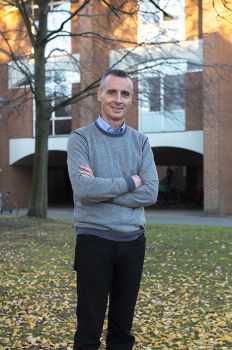University of Sussex recognised in UK’s Best Breakthroughs list
By: James Hakner
Last updated: Thursday, 6 December 2018

Professor Gordon Harold
Work of psychologist Professor Gordon Harold celebrated for transformational impact on child mental health
University of Sussex research into child mental health has been named as one of the UK’s 100 best breakthroughs for its significant impact on people’s everyday lives.
Professor Gordon Harold, Director of the University’s Andrew and Virginia Rudd Centre for Adoption Research and Practice, is honoured in the UK’s Best Breakthroughs list of the last century for his pioneering work, which has fundamentally shifted the Government’s approach to child mental health.
His research has compellingly dismantled the idea that children are only affected by their genes – instead it shows the positive impact of good parenting and healthy relationships between parents, whether or not they are married, living together or genetically related to their child. He works with families of adopted children, families where children have been born though assisted reproductive techniques such as IVF, and those where parents are divorced or separated.
The list of breakthroughs demonstrates how UK universities are at the forefront of some of the world’s most important discoveries, innovations and social initiatives. Professor Harold’s work is listed alongside the discovery of penicillin, work tackling plastic pollution, ultrasound scans to check the health of unborn babies and the establishment of the Living Wage.
The list was compiled by Universities UK, representing universities across the country, as part of a new MadeAtUni campaign, which aims to change public perceptions of universities and bring to life the difference they make to people, lives and communities across the UK.
It follows independent research undertaken by Britain Thinks, which found that the public has little understanding of the benefits of universities beyond undergraduate teaching. The findings show that research is one of the key triggers to change opinion about universities but for many people, it is an abstract concept.
Professor Harold said: "Good research underpins everything that we take for granted or accept as everyday aspects of modern day 'quality of life'. Our health, wellbeing, safety, enjoyment of the arts, sciences, medicine, education and positive recreational pursuits are informed by good research, often conducted out of the limelight of modern media and public attention.
“UK universities are the forum for world-leading research, as evidenced by this list, adding both to the educational value of our students and promoting improved quality of life nationally and internationally.
“It is a true honour to be named as part of this awe inspiring list of UK-led, globally impactful research achievements over the past 100 years.”
Professor Adam Tickell, Vice-Chancellor of the University of Sussex, said: “We’re extremely proud of the work of our academics and difference they are making to people, lives and communities.
“The MadeAtUni campaign is a great opportunity for us to show the wider world the work we do and the impact it has.”
Professor Dame Janet Beer, President of Universities UK, said: “Universities really do transform lives. The technology we use every day, the medicines that save lives, the teachers who inspire – all come from UK universities and the important work being done by academics.
“The UK’s Best Breakthroughs list is a testament to the difference that universities make to people’s lives and we want everyone to join us in celebrating the work they do.”
The UK’s Best Breakthroughs list: 100+ Ways Universities Have Improved Everyday Life was put together in partnership with universities across the UK. As part of the MadeAtUni campaign, every university in the country was invited to nominate the one thing from their institution which they believe has had the biggest impact on people, lives and communities. The entries cover health, technology, environment, family, community and culture and sport.
You can find out more about the UK’s Best Breakthroughs and the MadeAtUni campaign at www.madeatuni.org.uk.
